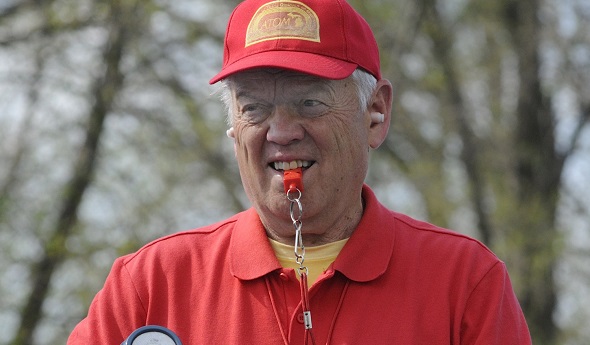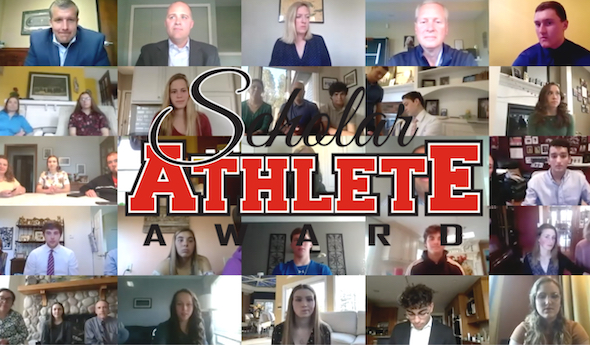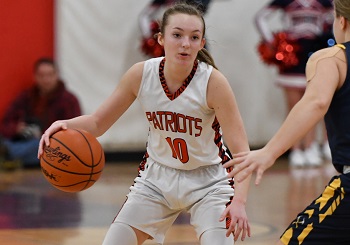
Legacies Live on in Matson's Work
By
Geoff Kimmerly
MHSAA.com senior editor
March 26, 2015
Hugh Matson was a sophomore on the 1951 Newaygo team that made the school's first trip to the MHSAA Boys Basketball Semifinals.
His team faced Dimondale in an auxiliary gym at Michigan State University’s Jenison Field House, but fell 56-54 in overtime when Dimondale scored the first basket of what was then a sudden-death extra period.
He watched the Class D championship game with some disappointment, knowing his team had come so close to playing on Jenison's main floor. But another highlight of that weekend has stuck with Matson, who has given back to high school sports as a teacher, coach, athletic director and official for more than 50 years.
After Matson and his team arrived in Lansing and checked into downtown’s Olds Hotel, they were directed to another room where they were welcomed by MHSAA executive director Charles E. Forsythe. It’s a memory Matson has enjoyed recalling recently – on Saturday, he will receive the honor bearing Forysthe’s name.
Matson will receive the 38th Charles E. Forsythe Award, for his long and various contributions to education athletics, during the first-quarter break of Saturday’s Class A Boys Basketball Final at the Breslin Center.
"That's very important to me. He was the big name in athletic administration when I got into it as an athletic director," Matson said. "He was known all over the United States as one of the great athletic directors, and I really feel honored. I'm humbled by it, naturally."
Forsythe was the MHSAA’s first full-time and longest-serving chief executive. Forsythe Award recipients are selected each year by the MHSAA Representative Council, based on an individual's outstanding contribution to the interscholastic athletics community.
Matson, 79, has deep roots in education. His mother Velma – who died in January at 104 years of age – was a longtime educator in Newaygo and with his father Francis established a scholarship for graduating seniors still awarded today. Hugh Matson took his first teaching job in 1957, at Mattawan, then followed older brothers Bill and Max to Saginaw Township Community Schools, teaching and coaching at Saginaw MacArthur High school from 1962-71 and then Saginaw Eisenhower from 1971-88.
Matson served as head varsity football and track and field coach at Mattawan and as head track and field coach at both MacArthur and Eisenhower, in addition to serving as an assistant football coach at both schools. He also became the first and only athletic director in Eisenhower’s history – holding that position from the school’s first day until the end of the 1987-88 school year, when he became co-athletic director of the new Saginaw Heritage High School, which was created from a merger of MacArthur and Eisenhower. Matson served as the sole full-time athletic director of Heritage for 1996-97 before retiring.
“Hugh has been dedicated to improving athletics in Michigan for more than 50 years, and his contributions stretch over every aspect of our games and beyond the Saginaw area,” MHSAA Executive Director John E. “Jack” Roberts said. “He showed leadership not only in his community for many years but at the statewide level among his colleagues, and continues his involvement as a valued official. We’re glad to honor Hugh Matson with the Forsythe Award.”
Matson has been a member of the Michigan Interscholastic Athletic Administrators Association (MIAAA) since 1970 and served as its president during the 1989-90 school year. He also was a member of the National Interscholastic Athletic Administrators Association (NIAAA) for three decades and has been a member of the Association of Track Officials of Michigan (ATOM) since 1993. Matson received distinguished service awards from both the MIAAA and ATOM and served as a representative and speaker for the MIAAA at regional conferences in Iowa and Wisconsin and to the NIAAA Leadership Forum in 1987.
 During his time as athletic director, Matson hosted MHSAA Districts or Regionals for seven sports. He’s been an MHSAA registered official since 1970 and has officiated 25 MHSAA Regionals in either cross country or track and field and 12 MHSAA Finals. He also has officiated cross country and track and field at the Division I, II and III and NAIA collegiate levels.
During his time as athletic director, Matson hosted MHSAA Districts or Regionals for seven sports. He’s been an MHSAA registered official since 1970 and has officiated 25 MHSAA Regionals in either cross country or track and field and 12 MHSAA Finals. He also has officiated cross country and track and field at the Division I, II and III and NAIA collegiate levels.
“Hugh was excellent with students, parents and staff during his 42 years as a teacher and coach at Eisenhower and Heritage High School. He is extremely positive with the kids as an official,” said current Saginaw Heritage athletic director Peter Ryan, also a member of the MHSAA Representative Council. “Hugh has been dedicated to improving athletics in the state of Michigan, and his passion for athletic officiating is contagious.”
“I still think I have the energy for it, and I enjoy it a lot,” Matson said. “Every day before I go to a track meet, my (wife Jackie) says, ‘Have fun.’ And she says when I come home, ‘Did you have fun?’ And yeah, I have fun. Working with younger people also, it keeps me youthful.”
Matson received his bachelor’s degree in physical education with minors in English and history in 1957 from Western Michigan University. He taught English and history at Mattawan, and then English and physical education during his three tenures as part of Saginaw Township Community Schools. In addition to his mother and brothers, Matson’s sister Joelyn also worked in education, recently retiring from the University of Toledo.
Past recipients of the Charles E. Forsythe Award
1978 - Brick Fowler, Port Huron; Paul Smarks, Warren
1979 - Earl Messner, Reed City; Howard Beatty, Saginaw
1980 - Max Carey, Freesoil
1981 - Steven Sluka, Grand Haven; Samuel Madden, Detroit
1982 - Ernest Buckholz, Mt. Clemens; T. Arthur Treloar, Petoskey
1983 - Leroy Dues, Detroit; Richard Maher, Sturgis
1984 - William Hart, Marquette; Donald Stamats, Caro
1985 - John Cotton, Farmington; Robert James, Warren
1986 - William Robinson, Detroit; Irving Soderland, Norway
1987 - Jack Streidl, Plainwell; Wayne Hellenga, Decatur
1988 - Jack Johnson, Dearborn; Alan Williams, North Adams
1989 - Walter Bazylewicz, Berkley; Dennis Kiley, Jackson
1990 - Webster Morrison, Pickford; Herbert Quade, Benton Harbor
1991 - Clifford Buckmaster, Petoskey; Donald Domke, Northville
1992 - William Maskill, Kalamazoo; Thomas G. McShannock, Muskegon
1993 - Roy A. Allen Jr., Detroit; John Duncan, Cedarville
1994 - Kermit Ambrose, Royal Oak
1995 - Bob Perry, Lowell
1996 - Charles H. Jones, Royal Oak
1997 - Michael A. Foster, Richland; Robert G. Grimes, Battle Creek
1998 - Lofton C. Greene, River Rouge; Joseph J. Todey, Essexville
1999 - Bernie Larson, Battle Creek
2000 - Blake Hagman, Kalamazoo; Jerry Cvengros, Escanaba
2001 - Norm Johnson, Bangor; George Lovich, Canton
2002 - John Fundukian, Novi
2003 - Ken Semelsberger, Port Huron
2004 - Marco Marcet, Frankenmuth
2005 - Jim Feldkamp, Troy
2006 - Dan McShannock, Midland; Dail Prucka, Monroe
2007 - Keith Eldred, Williamston; Tom Hickman, Spring Lake
2008 - Jamie Gent, Haslett; William Newkirk, Sanford-Meridian
2009 - Paul Ellinger, Cheboygan
2010 - Rudy Godefroidt, Hemlock; Mike Boyd, Waterford
2011 - Eric C. Federico, Trenton
2012 - Bill Mick, Midland
2013 - Jim Gilmore, Tecumseh; Dave Hutton, Grandville
2014 - Dan Flynn, Escanaba
The MHSAA is a private, not-for-profit corporation of voluntary membership by more than 1,400 public and private senior high schools and junior high/middle schools which exists to develop common rules for athletic eligibility and competition. No government funds or tax dollars support the MHSAA, which was the first such association nationally to not accept membership dues or tournament entry fees from schools. Member schools which enforce these rules are permitted to participate in MHSAA tournaments, which attract more than 1.4 million spectators each year.
PHOTOS: (Top) Hugh Matson continues as an MHSAA official and has worked at all levels of college as well. (Middle) Matson accepts his induction into the Saginaw Sports Hall of Fame in 2014. (Photos courtesy of Saginaw Heritage High School.)

2020 Class Honored Together, from Afar
By
Geoff Kimmerly
MHSAA.com senior editor
May 15, 2020
Ishpeming Westwood’s girls basketball team was two hours into a three-hour trip to its Division 3 Regional Final on March 12 when the Patriots were told to turn the bus around and come home.
In an instant, the 2019-20 school year – and with it all MHSAA sports across the state – had come to a halt. And two months later, the high school world and its sports community continue to wait for bits of normalcy to return.
On Wednesday, we were able to enjoy a little bit of normal that’s been part of the annual MHSAA calendar for three decades. A Zoom call brought together 31 families from all over the state along with MHSAA staff and Farm Bureau Insurance CEO Don Simon to celebrate this year’s MHSAA/Farm Bureau Insurance Scholar-Athlete Award winners.
Living rooms, kitchens and home offices replaced Breslin Center as settings for this “virtual” ceremony. And yet, this ceremony may be remembered more than any other because of its necessity – due to the COVID-19 pandemic – and because of how it brought so many together, remotely, while the coronavirus has forced all of us to remain apart.
Below is the ceremony, in full, including words from Simon, MHSAA Executive Director Mark Uyl and Assistant Director Andy Frushour and, for the first time, a student speaker from the class – Ishpeming Westwood senior Madelyn Koski, who was part of that basketball team destined for Sault Ste. Marie. A brief Q&A with Koski follows.
Koski was an all-stater on the court who would’ve finished her high school career with four varsity letters each for hoops, tennis and softball. She will continue at Ferris State University, where she’ll pursue a degree in pharmacy and continue her basketball career.
Second Half: How did you decide what you wanted to say? Was there a message you wanted to get across?
It was easy to write the sad part, because I know what happened – I was there. But it was hard for me to make a positive spin at the end because I don’t think anyone’s over it yet. I was glad to be able to turn it into something that was bigger than sports … more about our whole lives and less about our time in high school.
Second Half: It’s been two months. How have you been navigating the disappointment, the sadness? And is there advice you’d give to other people your age trying to do it?
As time went on, it got a little bit better. The day after was pretty sad; that’s all I could think about. Now there’s so many other things to do – the weather’s nicer, we can go outside. And I’m playing college basketball – not everyone has that chance – but at least I have that to practice for, look forward to.
I guess, it’s just … time heals.
Second Half: Even though you can’t be with them and hang out with them, I’m sure you’re talking a lot of your friends and teammates. What kind of conversations are you having? Is it looking ahead? Is it still thinking about, “We’d be playing softball right now?"
I think we kinda tried to leave the basketball stuff in the past because it was too sad to talk about. We made sure we do talk, obviously not in person, but on social media or FaceTime, we just talk about our memories and everything. That helped. It didn’t close the chapter, but it was nice to talk to them when we were all alone. And now we just don’t talk about that anymore. Nobody really wants to talk about it. We see memories popping up on Facebook and all these other things about, “Oh, we had a softball game last year at this time.” And it’s pretty sad. But no one else is playing. So it’s like we’re all in the same boat.
 Second Half: You can turn on the news and you can see what every adult has to say about what’s going on right now. … You’re 17, you’re finishing your last year of high school, you’re going through something no one has gone through in more than 100 years. How do you see everything that’s happening in the world right now, as you look at it from a 17-year-old’s point of view and see seasons end and school end?
Second Half: You can turn on the news and you can see what every adult has to say about what’s going on right now. … You’re 17, you’re finishing your last year of high school, you’re going through something no one has gone through in more than 100 years. How do you see everything that’s happening in the world right now, as you look at it from a 17-year-old’s point of view and see seasons end and school end?
I know we can’t help what happened. But obviously I think it’s unfair that it happened to our class. It stinks for every grade, but (as seniors) we’re missing out on our best parts of high school right now and it’s pretty horrible. We’ve been waiting years for our senior proms and graduations, banquets and award ceremonies, like the MHSAA one. So that kinda stinks.
Ever since March 12, I’ve been staying optimistic. But I’m proved wrong every time because things just keep getting canceled and canceled. … (But) I’m a pretty optimistic person, so I still have some left.
Second Half: What happens next? What does your summer look like? What happens for people who are in your shoes?
I’ll keep working out, and one of the girls on my high school basketball team is going to play at Michigan Tech so (eventually) we can work out together. … I think the biggest thing to do this summer, that I think I’ll do, is appreciate time with my family. I have gotten to spend a lot of time with them. And then maybe once summer rolls around and we’re allowed to be in bigger groups, I’ll be able to be with people other than my mom and dad, like my grandparents and cousins and my aunts and uncles. … (My sister Jillian and I) have been playing the same varsity sports for the last couple of years, and she’s been really successful. It’s been fun to win all these championships and stuff with her.
Second Half: What do you think you’re going to remember from this in five years, 10 years, when people ask you what your experience was like?
I’m probably going to say it’s a pretty bad experience. I guess it was an eye-opener that life can change at any moment. That’s kind’ve it. It didn’t change in a good way.
PHOTO: Westwood's Madelyn Koski sets up a play as Negaunee's Breanne Giotto defends her during their Jan. 24 game. (Photo by Cara Kamps.)

